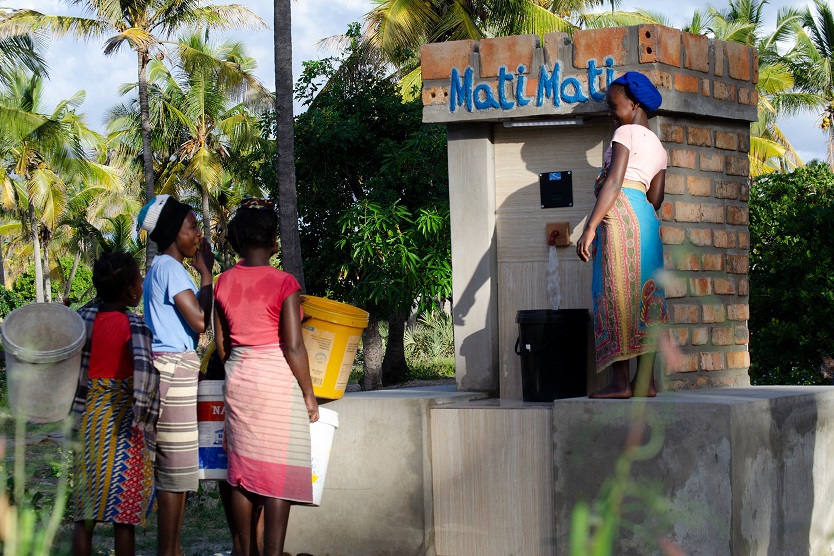
Women in front of “Mati Mati” in Mosambik
© dena
Companies: ENTERIA Energietechnik GmbH, WILO, iSAtech water GmbH,
Partner Institutions: Aktion Afrika e.V., The Government of the Inhambane Province and the German Energy Agency (dena)
Technology and service: solar wells, financing model
In Pembane, on the coast of Mozambique, the effects of climate change are already more than noticeable. More than half of the rural population in this south-eastern African country has no or only limited access to clean drinking water. The ongoing drought is now forcing many inhabitants to walk many miles just to get their daily water supply. The engineers at ENTERIA Energietechnik GmbH and their impact-investors have come to the conclusion that this cannot go on. They are using their knowledge and capital to work with the people of Mozambique to enforce their right to clean water.
To this end, they developed a pilot project to combine a sustainable energy supply in Germany with fair drinking water supply in Africa. The Mati Mati (Water Water) project was born from these considerations. It stands for cross-regional climate justice, technology transfer and fair engineering. It is implemented through the Renewable Energy Solutions Programme (RES Programme) as part of the German Energy Solutions Initiative with support from the Federal Ministry of Economic Affairs and Energy. With pump manufacturer WILO, Aktion Afrika e.V., iSAtech water GmbH and the German Energy Agency (dena), ENTERIA is supported by committed experts from various fields in this project.
Side note: The project’s name, "Mati Mati", means "water water" in Guitonga, one of the traditional national languages of Mozambique, and expresses the spontaneous joy that people feel when they suddenly find clean water.
In July 2020, the time had come and despite the global COVID-19 pandemic, a solar well was commissioned in Pembane. Since then, it has been pumping clean fresh water into a ten-metre high water tower and distributing it within a radius of 1.5 kilometres through a water network to eight easily accessible water fountains, that are known as "Fontenarias". With a delivery volume of up to 25,000 litres per day, water from dirty water holes in Pembane is now a thing of the past. Thus, the project increased villagers’ quality of life considerably.
System Data (solar wells and tap system)
| Tap System | 1 tower, 8 taps |
| Coverage | 200 mts2 |
| No. of People being supplied | 500 |
| Pump | WILO Actun Opti MSH4.02-02 |
| Pump capacity & power | 25.000 Lts. /day |
| Pump power | 1.1 kW |
| Solar Module | Aleo Solar Modul X 59 HE – 320 Wp (mono) |
| Inverter | Integrated in the Pump |
| Installed capacity | 2,56 kWp |
| Annual yield | 25.721 kWh / year |
The villagers can register for the project and receive a 50-litre starter voucher on their chip card, which is necessary to obtain water from the "Fontenarias". Every user who benefits from this water fountain has to make a small financial contribution. This strengthens the appreciation for the village fountain while also creating a necessary buffer to cover maintenance and repairs. Only a small fee of 0.10 Metical (approx. 0.001€) per litre of water is charged to cover the system’s maintenance fees. People can recharge their chip card at the water kiosks or online.
For the Wuppertal-based company ENTERIA, it has always been important that the project is sustainable and that residents see the water network as a common good of the village. Therefore, a central idea of their concept is that the revenue generated by the system remains in the village and is used for the construction and maintenance of the infrastructure, enabling the solar well to be economically self-sustaining.
To ensure the overall profitability of the project, ENTERIA developed three financing pillars with its partners. Firstly, interested parties can donate money and thus water-credit. Secondly, the solar well is economically linked to solar energy production in Germany. For this purpose, ENTERIA is developing a cloud solution together with Berlin-based prepaid delivery systems provider iSAtech water GmbH, which will enable solar parks in Germany to contribute to the financing of further wells in Africa. The generation of CO2-free solar power in Germany will then be linked via the Internet to the promotion of clean water in Africa. In addition, ENTERIA, together with its impact investors, has committed itself to investing ten percent of its fixed assets in projects such as Mati Mati, enabling the installation of solar water systems in faraway Africa.
The Mati Mati project, supported by the RES programme, began in 2018 and has been accompanied by extensive PR, marketing and training campaigns. The project will be completed by the end of this year. Follow-up projects are already underway.


